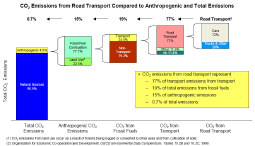Why all the fuss about being green?
There are many ways to improve our sustainability, or better, reduce our negative environmental impact. "Total sustainability" is unlikely to ever be achievable, but at least we can make an effort to live as sustainably as possible.
The reason why it is important to reduce our environmental impact is the risk of significant climate change. Today, there is an overwhelming agreement among scientists that this is happening, that it is man made, and that the potential consequences can be devastating for large parts of the planet's population.
With a share of 80%, fossil fuel combustion accounts for the lion share in anthropogenic emissions. 25% of fossil fuel combustion is incurred by transport (mostly road transport with cars), and 75% by non-transport sources (mostly energy producing power plants, and to some extent industrial plants). This analysis shows the main levers that we have at our disposal in order to combat global warming: transport and energy production. As for the latter, citizens can't single handedly transform dirty coal plants into solar installations. But our use of energy and product purchase decisions can have a strong impact on the energy production sector.
Green Living explained
Sustainable Living takes a look at specific measures we can adopt for transport in general as well as in our everyday lives (at home, at work, in our shopping etc.).
The Alternative fuels section presents alternatives to traditional petrol, ranging from Hybrid Electric Vehicles to the currently much discussed topic of biofuels and fuel cells.
Renewable energies will play an increasingly important role in our energy mix, and in the challenge to achieve a higher sustainability. Most importantly, they can be employed in conjunction with electric vehicles, which allows us to achieve almost zero emissions from well-to-wheel, or total sustainability (nice!).
We also take a look at Carbon Offsetting, once again a much-discussed topic. The objective here is to provide background information that allows to participate in discussions and distinguish measures which are sensible from the general hype.
Last but not least, the Climate Change section gives the scientific background on why this all matters.

